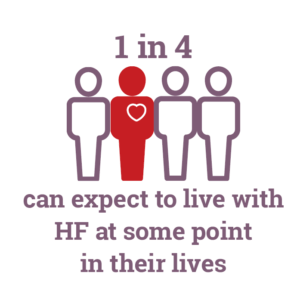Heart failure is a common but complex clinical syndrome where the heart cannot pump enough blood to meet the body's needs
 Heart failure occurs when the heart becomes too weak or stiff to pump enough blood around the body. Symptoms and signs include breathlessness, extreme fatigue, reduced exercise capacity and fluid retention resulting in weight gain and/or swelling (especially of lower limbs and abdomen). Symptoms can severely impact a person’s quality of life, and may be life-threatening.
Heart failure occurs when the heart becomes too weak or stiff to pump enough blood around the body. Symptoms and signs include breathlessness, extreme fatigue, reduced exercise capacity and fluid retention resulting in weight gain and/or swelling (especially of lower limbs and abdomen). Symptoms can severely impact a person’s quality of life, and may be life-threatening.
People may have symptoms of heart failure for many years before receiving a diagnosis, and management is often suboptimal. Many people are diagnosed in hospital following a rapid deterioration in their symptoms requiring an emergency admission.
More than 15 million people in Europe are estimated to be living with heart failure. It is a leading cause of hospitalisation, contributing to almost 2 million admissions a year in Europe. Its prevalence is expected to rise due to population ageing and improved survival rates for other long-term conditions, including cardiovascular diseases.









